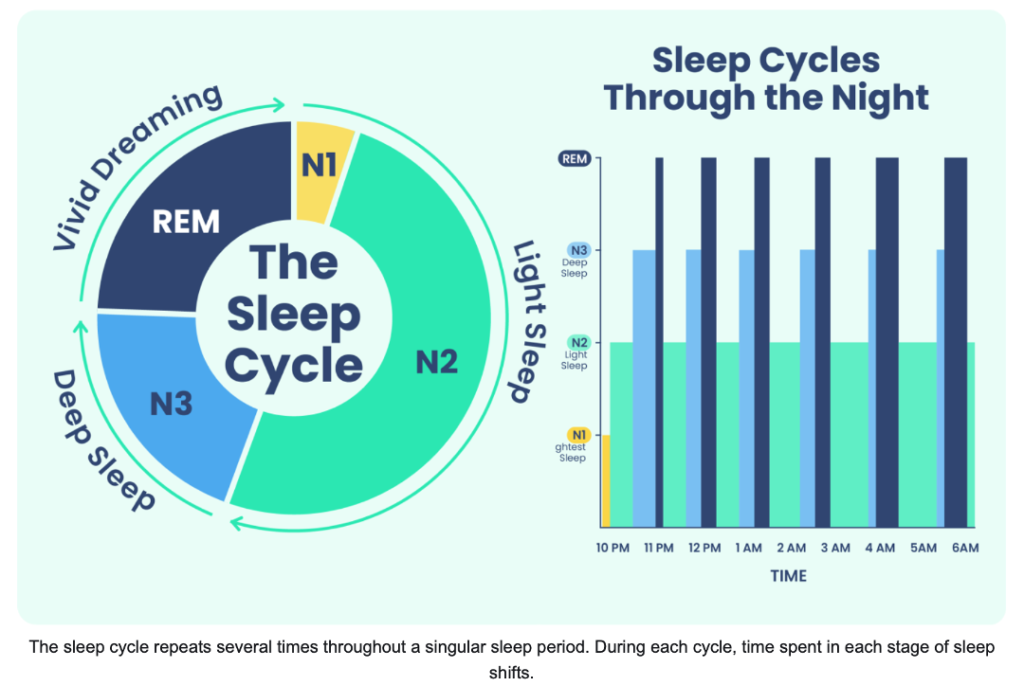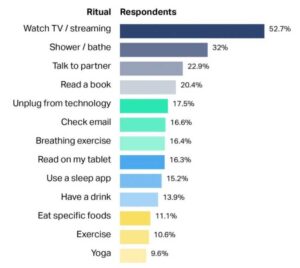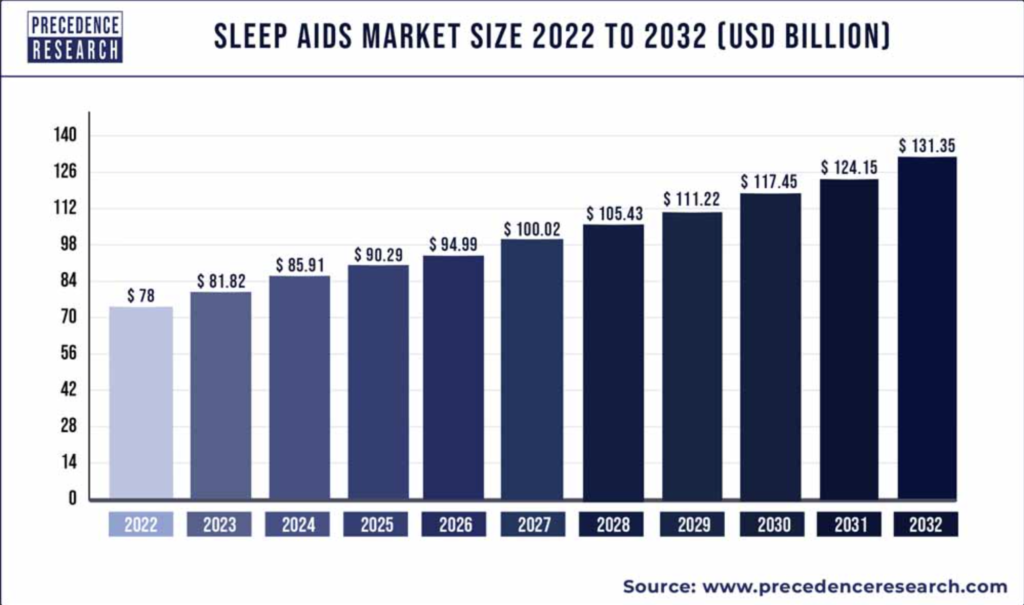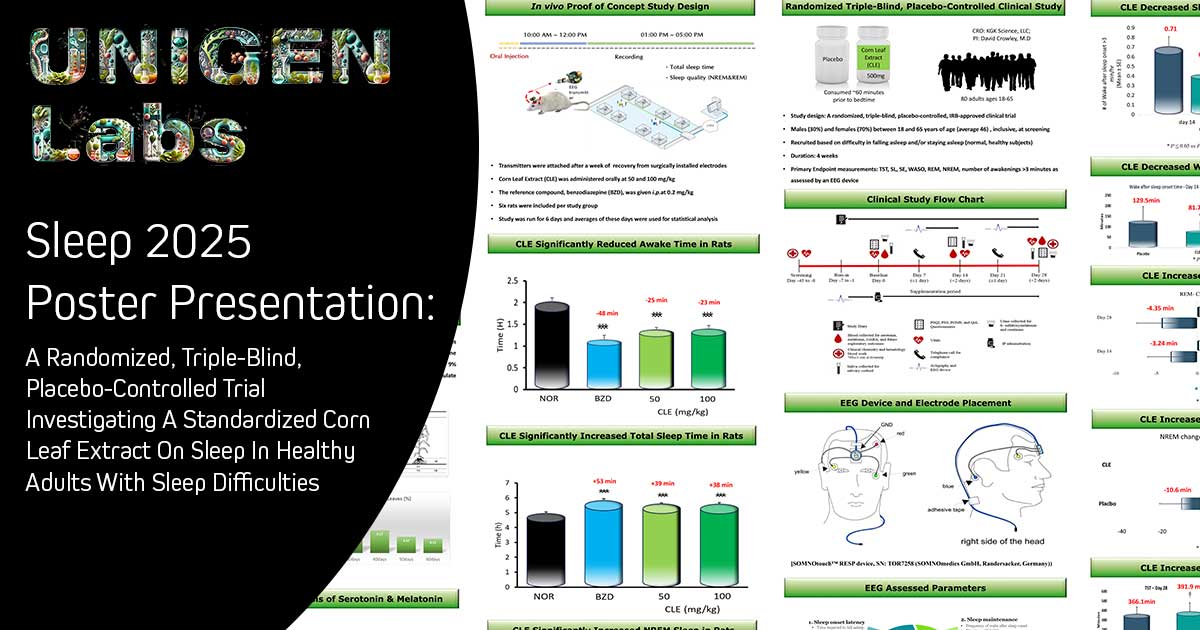The global sleep crisis is a growing concern, with more and more people struggling to get the rest they need. This has led to a booming market for sleep support supplements, with sales of these products increasing significantly in recent years. Consumers are seeking out natural options to manage stress and improve their sleep, and this trend is expected to continue. However, many people are concerned about the safety and efficacy of these supplements, and are looking for a safe, organic solution to their sleep problems. As the wellness market continues to grow, there is a need for high-quality, natural sleep aids that can help people get the rest they need without compromising their health. In this article, we will explore the global sleep crisis, the booming market for sleep support supplements, and the need for a safe, natural, and effective solution to this growing problem.
“Sleep is the Swiss army knife of health. When sleep is deficient, there is sickness and disease. And when sleep is abundant, there is vitality and health.”
Professor Matt Walker, PhD., Author of the book ‘Why We Sleep.’

The Importance of Sleep
Sleep serves as our body’s natural reset button, rejuvenating both our physiological and cognitive functions. In today’s busy world, where life seems to be on a constant fast-forward, many of us unknowingly compromise on the quality and duration of our sleep. This isn’t just about feeling groggy the next day; there’s a broader picture that intertwines our health and well-being with our sleep habits.
Research paints a compelling picture: consistent sleep insufficiency can tilt the scales of our body’s balance. Over time, this lack of quality sleep can negatively impact our health significantly; Our risk of heart-related issues may increase metabolic conditions like diabetes, unwanted weight gain may begin, and our mental clarity and ability to focus might decline.
Understanding Sleep Cycles
Sleep cycles are a natural process that occurs during sleep, and they are essential for good health. Humans spend about one-third of their lives asleep. Sleep consists of two distinct states known as rapid-eye movement (REM) sleep and non-REM (NREM) sleep, which cycle alternately throughout the night 4 – 5 times in a rhythmic pattern. Among adults, approximately 75–80 percent of the total sleep duration is dedicated to non-REM (NREM) sleep, with the remaining 20–25 percent allocated to REM sleep. REM sleep is linked to dreaming and is typically not regarded as a stage of restful sleep. NREM sleep is categorized into increasingly deeper stages—referred to as stage N1, stage N2, and stage N3— each detected by distinct electroencephalogram (EEG) patterns.

- Stage N1: this is the transition from wakefulness to sleep. During this stage, the body begins to relax, and brain waves slow down.
- Stage N2: a deeper stage of sleep than stage N1. During this stage, the body continues to relax, and brain waves slow down even further. This stage plays key role in procedural and declarative memory consolidation.
- Stage N3: Often termed as slow wave sleep (SWS), this is the deepest stage of sleep. During this stage, the body is in a state of complete relaxation, and brain waves are at their slowest. This is where we recuperate. This stage is often considered as the restorative stage of sleep. The body takes advantage of this very deep sleep stage to repair injuries and reinforce the immune system. It appears vital for cerebral restoration and recovery, as well as for memory maintenance and consolidation, and metabolic regulation. As we get older, we spend less time on this stage.
- Stage 4 (REM): REM sleep is the stage of sleep where dreaming occurs. During this stage, the body is in a state of complete relaxation, and brain waves are similar to those seen during wakefulness. REM sleep plays a role in memory consolidation, emotional processing, brain development, and dreaming.
Sleep cycles are important because they allow the mind and body to wake up refreshed. Progressing smoothly multiple times through the sleep cycle is a vital part of getting high-quality rest. Understanding the sleep cycle also helps explain how certain sleep disorders, including insomnia and obstructive sleep apnea, can impact a person’s sleep and health. Additionally, sleep plays a crucial role in many physiological processes such as memory consolidation, hormone regulation, and immune function. This is why it is so important to prioritize sleep health.
Health and Lifestyle Issues Related to Sleep Loss
Sleep deprivation can have major effects on many aspects of our daily lives, including insomnia, chronic diseases, depression, weight gain, and even job performance.
Insomnia
 Research has shown that sleep loss (less than 7 hours per night) may have wide-ranging effects on the cardiovascular, endocrine, immune, and nervous systems. Insomnia affects between 30-45% of the adult population. Insomnia is common in older adults, and the incidence of insomnia increases with aging. Insomnia can include difficulty falling asleep at the start of the sleep period, waking up during the night and having difficulty falling back asleep, and waking up early and being unable to get back to sleep. According to estimates, 9% to 15% of U.S. adults have insomnia that affects their daytime activities. Women are 40% more likely to have insomnia than men are. Sleep disorders during pregnancy may increase the odds of a premature birth by 33.9%. Specifically, women who are sleep-deprived during pregnancy may experience longer labor, more pain and discomfort during labor, and higher rates of preterm labor and cesarean section.
Research has shown that sleep loss (less than 7 hours per night) may have wide-ranging effects on the cardiovascular, endocrine, immune, and nervous systems. Insomnia affects between 30-45% of the adult population. Insomnia is common in older adults, and the incidence of insomnia increases with aging. Insomnia can include difficulty falling asleep at the start of the sleep period, waking up during the night and having difficulty falling back asleep, and waking up early and being unable to get back to sleep. According to estimates, 9% to 15% of U.S. adults have insomnia that affects their daytime activities. Women are 40% more likely to have insomnia than men are. Sleep disorders during pregnancy may increase the odds of a premature birth by 33.9%. Specifically, women who are sleep-deprived during pregnancy may experience longer labor, more pain and discomfort during labor, and higher rates of preterm labor and cesarean section.
Chronic Diseases and Depression
 Sleep deficiency is linked to many chronic diseases and conditions such as heart disease and depression. Although the effects of sleep deprivation on the organs have been obscure, recent studies revealed relationships between sleep deprivation, hypertension, and coronary heart disease. Sleep loss is also associated with adverse effects on mood and behavior. Adults with chronic sleep loss report excess mental distress, depressive symptoms, anxiety, and alcohol use. Additionally, the interrelatedness of sleep and depression suggests it is important that symptoms of depression be monitored among persons with a sleep disorder.
Sleep deficiency is linked to many chronic diseases and conditions such as heart disease and depression. Although the effects of sleep deprivation on the organs have been obscure, recent studies revealed relationships between sleep deprivation, hypertension, and coronary heart disease. Sleep loss is also associated with adverse effects on mood and behavior. Adults with chronic sleep loss report excess mental distress, depressive symptoms, anxiety, and alcohol use. Additionally, the interrelatedness of sleep and depression suggests it is important that symptoms of depression be monitored among persons with a sleep disorder.
Overeating and Weight Gain
 Insufficient sleep appears to affect the body’s ability to regulate blood sugar, increasing the risk of metabolic conditions like diabetes. Specifically, sleep duration and quality have emerged as predictors of levels of Hemoglobin A1c, an important marker of blood sugar control. Research has found that people tend to consume more calories and carbohydrates when they do not get enough sleep, which is just one of several ways that poor sleep may be tied to obesity and problems maintaining a healthy weight.
Insufficient sleep appears to affect the body’s ability to regulate blood sugar, increasing the risk of metabolic conditions like diabetes. Specifically, sleep duration and quality have emerged as predictors of levels of Hemoglobin A1c, an important marker of blood sugar control. Research has found that people tend to consume more calories and carbohydrates when they do not get enough sleep, which is just one of several ways that poor sleep may be tied to obesity and problems maintaining a healthy weight.
Workplace Impact and Safety Concerns
 Lack of sleep or poor sleep results in unplanned absences from work that cost the U.S. economy an estimated $44.6 billion each year. 7% of adults nap every day. 81% of adults have taken a nap of 10 minutes or longer in the past three months. Additionally, drowsy driving is responsible for more than 6,000 fatal car crashes every year in the United States.
Lack of sleep or poor sleep results in unplanned absences from work that cost the U.S. economy an estimated $44.6 billion each year. 7% of adults nap every day. 81% of adults have taken a nap of 10 minutes or longer in the past three months. Additionally, drowsy driving is responsible for more than 6,000 fatal car crashes every year in the United States.
The Japanese phenomenon of “karoshi” means “death brought on by extreme sleep deprivation”. Most cases of karoshi involved acute cardiovascular events. Likewise in the United States, a recent National Sleep Foundation poll found that many Americans have long-term sleep deprivation. Sleep loss is a common condition in modern society, with evidence showing that people are sleeping on average only 6.8 hr per night, 1.5 hr less than a century ago.
The Cost of Constant Connection
Our modern lifestyle throws in another challenge: ever-present electronic devices. The glow from our screens, especially in the evenings, can meddle with our body’s internal sleep-wake cycle or circadian rhythm. This tech-induced insomnia isn’t just an adult’s game. Adolescents, often glued to their devices, face heightened risks from this disrupted sleep, such as potential weight gain, frequent bouts of depression, anxiety, and difficulty maintaining focus.
- Everybody Uses Them: According to a survey conducted by the National Sleep Foundation, 95% of Americans use electronic devices within an hour of going to bed, and 75% of them report that they use these devices in the hour before going to sleep.
- They Make Falling Asleep Harder: The blue light emitted by electronic devices, such as smartphones, tablets, and laptops, can suppress the production of melatonin, a hormone that regulates sleep-wake cycles. Another study found that the use of electronic devices before bedtime was associated with a delay in the timing of the body’s internal clock, which can lead to sleep problems and other health issues.
- They Reduce Sleep Quality: A study published in the Journal of Clinical Sleep Medicine found that the use of electronic devices before bedtime was associated with less sleep overall and poorer sleep quality.
- Many of Us Are Addicted: A survey conducted by the American Psychological Association found that 43% of adults reported that they were too connected to their electronic devices, and 36% reported that they were unable to unplug and relax.
As you can see, electronic devices can have a major negative impact on sleep quality and quantity. It is important to limit the use of electronic devices before bedtime to promote healthy sleep habits. Understanding our sleep patterns, challenges, and the significance of sleep quality is very important for our quality of life and our overall health.

Common Solutions to the Sleep Problem
Given the massive problems related to lack of sleep, it is no surprise that we have tried to solve them in many ways.
“Sleep Hygiene” and Other Lifestyle Changes
Sleep hygiene is defined as a set of behavioral and environmental recommendations intended to promote sleep, and was originally developed for use in the treatment of mild to moderate insomnia. The most common sleep hygiene recommendations are creating a relaxing and regular bedtime routine, avoiding stimulants before bed, regular exercise, and reducing stress.

Unfortunately, research has shown that sleep hygiene alone may not always be enough to help individuals with insomnia or other sleep disorders. Additionally, it’s important to acknowledge the intricate relationship between behavioral habits and environmental factors when evaluating sleep hygiene. Alterations in a single aspect of sleep hygiene can inadvertently influence other habits. For instance, cutting out caffeine can lead to heightened stress and a reduction in physical activity, potentially having a negative effect on sleep quality. Conversely, minimizing daytime napping can cause an uptick in caffeine consumption to fend off daytime drowsiness.
Sleep hygiene doesn’t address the root causes of insomnia like ongoing pain, depression, or anxiety. “Sleep hygiene gives you a framework to change some habits, but it may not focus on these core things,” says Annie Miller, a behavioral sleep medicine therapist at DC Metro Sleep and Psychotherapy.
Dietary Supplements for Sleep Support
Consumers are turning to sleep supplements and natural products in droves, as part of a multistep sleep solution customized to their needs. The pandemic propelled consumer VMS use up by nearly 20%!
Consumers are purchasing pillows, sleep masks, trying sleep apps, and experimenting with sleep supplements to maintain their health and wellness habits, including sleep regimens. The Life Extension survey found that 82% of U.S. consumers polled said they are interested in vitamins and supplements that can improve quality of sleep. Natural sleep aids are over-the-counter supplements intended to help you fall asleep faster or stay asleep longer. Many customers prefer natural sleep supplements because they tend to have fewer side effects than prescription sleep medications.

Here are some of the most popular sleep support supplements on the market:
- Valerian is an herb that people use as a sedative or sleep aid. It is a commonly used supplement for sleep support, and studies suggest that it may help improve total sleep time, sleep latency, number of nightly awakenings, and insomnia severity index.
- Lavender is a plant that is known for its calming properties and is often used in aromatherapy to promote relaxation and sleep.
- Passionflower is a plant that is commonly used as a natural remedy for anxiety and sleep problems. Studies suggest that it may help improve sleep quality and reduce anxiety.
- Chamomile is an herb that is often used in tea to promote relaxation and sleep.
- CBD oil is a non-psychoactive derivative of hemp or marijuana that some people use to relieve anxiety and promote sleep.
- Triptophan is an essential amino acid that plays a role in the production of serotonin, melatonin, niacin, and nicotinamide. Studies have shown that increasing tryptophan in the diet can improve sleep by increasing melatonin.
- GABA is an inhibitory neurotransmitter used in supplement formulation for sleep enhancing.
- 5-HTP is is a chemical byproduct of the protein building block L-tryptophan. 5-HTP increases serotonin levels and is used for conditions in which serotonin is believed to play an important role.
- Magnesium: Some research suggests that supplemental magnesium may help reduce insomnia in older adults, either when used alone or with melatonin and zinc.
- L-theanine is an amino acid that is found in tea leaves and is known for its calming effects.
- And, of course, Melatonin. Contrary to popular belief, melatonin is a hormone, not a drug. It sends chemical messengers throughout the body to regulate sleep patterns.
While herbs and supplements such as these are commonly and generally safely used as natural remedies for sleep problems, research suggests that they may not work well for everyone. For example, Valerian root may cause headaches, dizziness, upset stomach, heart disturbances, and even insomnia in some people. L-theanine may not be safe for people who are pregnant or breastfeeding, or people who have low blood pressure. Lavender might decrease blood pressure in some people, and may also cause constipation, headache, and increased appetite.
The most popular supplement for sleep, by far, is melatonin. In the U.S., melatonin sales grew from $285 million in 2016 to a staggering $821 million in 2020, according to a 2022 Centers for Disease Control and Prevention study.

Melatonin: A Not-So-Straightforward Sleep Solution
Melatonin is a hormone secreted by the pineal gland in the brain, primarily responsible for regulating the sleep-wake cycle. It helps the body know when it’s time to sleep and wake up, and its production increases in the evening with darkness, orienting the body’s circadian rhythm. Melatonin is available as a supplement in pill form, and there are two types: natural (from the pineal gland of animals) and synthetic (manmade).
Melatonin Dosage and Formulation
Consuming melatonin one to two hours before going to bed may be beneficial for addressing sleep disturbances tied to the body’s internal clock. While there is some research suggesting it may help alleviate the transient sleep disruption caused by jet lag from travel, such findings are not definitive, and the potential advantages seem to be relatively minor. Individuals who work non-standard hours, such as shift workers, might find that melatonin helps them, as might those suffering from delayed sleep-wake phase disorder—a condition that interferes with falling asleep at a conventional hour, often leading to tiredness during the day. Additionally, since melatonin production decreases as people age, older adults who experience difficulty with sleep onset might find that melatonin supplements could offer some improvement.
As melatonin is so widely available over the counter (in the U.S.), in many different doses and delivery formats, there is most likely a convenient option to meet everybody’s preferences. Melatonin supplements are generally considered to be safe, according to the Mayo Clinic. Many people who take it might choose it over sleep drugs as it is a hormone and is naturally produced by the body.
In recent years, melatonin has been taken by more people in increasingly higher doses. In response to consumer concerns about melatonin dosage levels and side effects, manufacturers are pursuing options to partner qualified ingredients with lower levels of melatonin. Maizinol® is the natural, clinically proven solution for this innovative reformulation.

Maizinol® – A Natural Choice for Restorative Sleep
Given the limitations of existing dietary supplements for sleep, there is an opportunity for a safe, natural, and effective solution to this growing sleep problem.
Surprisingly, the answer may have come from one of the most common plants we know – corn! Corn, or maize (Zea mays), has been used in various ways throughout history for food, and some parts of the plant, such as corn silk, have been used in traditional medicine, primarily for urinary and kidney-related conditions.
However, the corn leaf itself, when harvested as a new shoot and processed/extracted in a certain way, contains compounds known to bind to melatonin receptors and yield melatonin-like effects, enhancing sleep quality. This is a superior method to ingesting the melatonin hormone itself, as it enables the body to generate appropriate levels of melatonin, and therefore does not cause the unpleasant side effects and other issues related to overdose levels of exogenous melatonin.
Unigen has developed a patented, clinically proven, natural sleep aid derived from non-GMO Zea mays (corn leaf) called Maizinol®. Maizinol® is hormone-free and has demonstrated in clinical studies its effectiveness in enhancing the deep sleep stage, as measured by the Pittsburgh Sleep Quality Index (PSQI). Furthermore, the biologically active compounds in Maizinol® have been proven to bind to melatonin receptors with a 4-fold higher affinity for the MT2 Receptor.
Key benefits of Maizinol® include once-a-day dosing, which encourages consumer compliance, high compatibility with other ingredients, and a long history of safe human use. The ingredient comes from a natural plant source and has undergone extensive safety testing without any adverse effects.
Maizinol® works through the melatonin pathway and increases the biosynthesis of melatonin. It doesn’t cause headaches, next-day grogginess, or interfere with the body’s natural circadian rhythm.
Key Takeaways
- Maizinol® is a patented, clinically proven, natural sleep aid derived from Zea mays (corn leaf) that contains proprietary standardized compounds known to bind to melatonin receptors and yield melatonin-like effects, enhancing sleep quality.
- In preclinical trials, Maizinol® has been shown to:
- extend the deep, restorative stage of sleep, increase non-REM sleep, and prolong total sleep time.
- promote the endogenous biosynthesis of melatonin, resulting in an increase in brain melatonin.
- assist in maintaining a healthier sleep duration following caffeine induced sleep disturbance.
- Maizinol® is a natural and hormone-free alternative to other sleep support supplements, which can cause headaches, next-day grogginess, or interfere with the body’s natural circadian rhythm.
- Maizinol® is effective with once-a-day dosing for increased consumer compliance.
- Maizinol® has high compatibility in formulating with other ingredients and can be used as an active agent in tablets, capsules, liquids, gels, gummies, powders, bars, RTD and other delivery systems.
- Maizinol® is non-habit forming and has undergone extensive safety testing without any adverse effects.
Clinical Support for Maizinol®
Unigen has released a clinical study on its patented natural sleep aid, Maizinol®, as published in the Journal of Medicinal Food. The study, conducted on 45 participants aged 19-73, demonstrated that Maizinol® significantly enhanced sleep quality by increasing the deep sleep stage by almost 30 minutes. In comparison, the placebo group saw only a 4-minute increase. The research, which lasted for four weeks and followed a two-week baseline period, found Maizinol® to be effective in maintaining healthy cortisol levels, reducing the chances of premature waking. The study supports the growing consumer trend towards natural sleep aids over synthetic melatonin. In summary, UP165, the corn leaf extract tested, not only improved sleep quality and duration, but also reduced stress and enhanced overall well-being.



